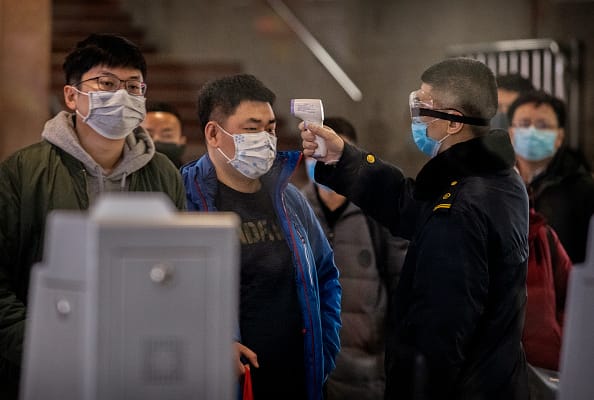
A Chinese passenger that just arrived on the last bullet train from Wuhan to Beijing is checked for a fever by a health worker at a Beijing railway station on January 23, 2020 in Beijing, China.
Kevin Frayer | Getty Images
BEIJING — Preliminary data show the scale at which the coronavirus outbreak is affecting the Chinese economy.
At a special press conference on Sunday, Chinese officials indicated the disease will remain an issue for the near future.
The immediate impact was visible in a drop in the flow of passengers. In an effort to prevent the virus from spreading, the government has encouraged people to stay at home, cancelled major public events and restricted travel for tens of millions.
Travel plunges
Overall travel on Saturday, the first day of the Lunar New Year, dropped 28.8% from a year ago, said Liu Xiaoming, vice minister of transport. Specifically, he noted declines of:
41.6% in civil air travel
41.5% in rail travel
25% for road transport.
On Sunday, China Railway Chengdu also announced it would halt several high-speed train routes — including some to Shanghai — for the next few days, into early February.
‘Severe shortage’ of medical supplies
Chinese authorities have stressed the need for locals to wear face masks, and have even imposed fines in some places for those in public spaces who do not wear one. Other items, such as virus testing kits and protective suits, are also understocked.
“We face a severe shortage of supplies given the demand,” Wang Jiangping, vice minister of industry and information technology, said Sunday, according to an official translation of his Mandarin-language remarks.
Wang noted a particular shortage of protective suits and face masks, especially in Wuhan. For example, Wang said about 100,000 protective suits are needed a day, but daily production capacity is at best in the low tens of thousands.
In an effort to meet these medical supply needs, Wang said 40% of overall production capacity is now back online, despite the Lunar New Year holiday.
Health care members make first aid to people as they cover their faces with sanitary masks after the first cases of coronavirus have been confirmed in Hong Kong.
Miguel Candela | Getty Images
Authorities also said Sunday that to improve medical conditions, they are drawing on inventory from the surrounding area, and working to add more hospital beds and medical staff.
China’s Ministry of Finance added in an online statement Sunday that various levels of finance ministries have issued 11.2 billion yuan ($1.6 billion) in subsidies for medical care, equipment purchases and other efforts to control the epidemic.
But the latest developments indicate these disruptions to regular economic activity may just be the beginning of a longer-term situation.
Beijing city said Sunday that local schools, from kindergartens to universities, will postpone resumption of the school year until further notice, according to state media. Based on the original Lunar New Year holiday calendar, Chinese were set to return to work on Jan. 31.


 Signal2forex.com - Best Forex robots and signals
Signal2forex.com - Best Forex robots and signals




